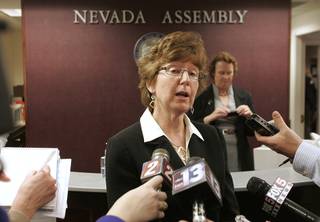Friday, Feb. 26, 2010 | 2 a.m.
Sun archives
- Bipartisanship emerges in anger at Gibbons over session deadline (2-25-10)
- Democrats: Trim education cuts to 5 percent (2-24-10)
- Gibbons adds to agenda, says session will end by Sunday night (2-24-10)
- Relationship between Gibbons, Raggio shows strain on Day 2 (2-24-10)
- Plan to use cameras to catch uninsured motorists appears dead (2-24-10)
- Gibbons’ budget plan risky in an election year (2-24-10)
- Anti-tax ideology tests Republicans (2-24-10)
- Gibbons pulls senior staff from legislative hearings (2-23-10)
- Gibbons denies, then admits taking texting friend to D.C. (2-23-10)
- Lawmakers to tackle water rights during special session (2-23-10)
- Proposal to close state prison meets opposition (2-23-10)
- Budget crunchtime: Lawmakers set to tackle historic deficit (2-23-10)
Most of Nevada’s government will soon transition to a four-day workweek. But the reasons for it go beyond filling the state’s $887 million deficit.
The plan, proposed by Gov. Jim Gibbons and broadly supported by legislators, will save $600,000 on energy costs, make it easier to implement a 10-hour-a-month furlough for state workers and lift their flagging morale.
But legislative sources point to another reason — even if they’re loath to admit it publicly — for this major change: The reduction in the availability of state services will make the public feel the effect of the revenue shortfall.
It’s a potentially controversial, if intriguing, strategy.
The citizen who isn’t attending college or doesn’t have a child in school or use social services, may not have felt the effects of previous rounds of cuts. But longer lines at the Department of Motor Vehicles, lengthier waits for birth and death records and delays for businesses dealing with state agencies might make Nevada’s stark financial situation personal.
Legislators cited first the potential economic benefits of the four-day week — Utah, which adopted the schedule in 2008, saw energy savings, overtime and sick leave among state employees decrease and citizens increasingly use online services.
But as Assemblywoman Debbie Smith, D-Sparks, said: “It’s important for us, as we cut across the board, to demonstrate to the public the impact of the cuts.”
Senate Minority Leader Bill Raggio, R-Reno, said that the goal was primarily cost-savings and efficiency, but “I think it’s important to let people, the critics out there, know that these cuts have an effect.”
Senate Majority Leader Steven Horsford, D-Las Vegas, said, “There’s no way we can cut $887 million without an impact on services, whether it’s the DMV or senior services.”
He acknowledged the Legislature has been able to avoid the most high-profile cuts so far with the help of federal stimulus dollars and a tax increase passed last session. This time, he said, “these cuts will have a much broader impact to all of us as Nevadans.”
As legislators work this special session to fill the deficit, they’re doing so with an eye toward the 2011 Legislature, when the situation could be more dire. Forecasters expect a deficit of $2 billion to $3 billion because of the loss of federal money and expiring taxes.
Legislators and lobbyists are predicting a contentious session as lawmakers will likely undertake realigning the state’s tax structure, including tax increases. To build support for higher taxes, some think the public needs to see the effects of the current shortage in tax revenue. Yet so far, many of the cuts have been confined to state employee salaries, services for the poor and elderly, and higher education.
Horsford proposed closing all state parks to save $8 million over two years. He said parks, although important, ranked second to education. The plan targeted a high-profile state service, used by a large segment of the population that would take notice.
That plan is dead. But the idea behind it — that the public needs to see the effects of budget cuts the Legislature is making — pervades in Carson City.
Smith said people have and will notice the effect on state services.
Secretary of State Ross Miller reported that earlier rounds of cuts caused a backlog in business registration applications.
Smith said the Legislature is likely to drain a graffiti removal fund at the Transportation Department; cut a bookmobile in rural Nevada; and end a National Guard youth program.
“Some of these things may not affect 5,000 people at once, but when you add them up, they’re significant,” Smith said.
One state agency that touches almost all citizens is the DMV. Many offices are open six days a week, but will be open four or five days a week, said Edgar Roberts, DMV director.
Health and Human Services Director Mike Willden said the 250,000 Nevadans on food stamps and 250,000 on Medicaid have seen the effect of cuts: longer lines and longer waits to process applications for assistance.
He said he will seek an exemption to the four-day week for welfare offices.
“I’m concerned that we can’t do a four-day workweek at our welfare office,” Willden said. “Theoretically, it’s the same 40 hours, but it’s a compaction issue. We have 1,000 people a day applying for benefits. I don’t think we can compact that into 4 days.”
The state is supposed to process applications for food stamps within 10 days, in an emergency, or within 30 days for less urgent cases. The welfare office met that goal 95 percent of the time last year, but now only meets it 80 percent of the time.


Join the Discussion:
Check this out for a full explanation of our conversion to the LiveFyre commenting system and instructions on how to sign up for an account.
Full comments policy